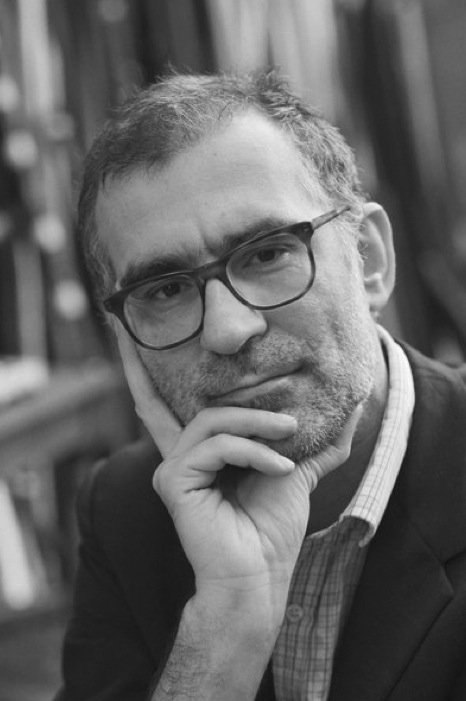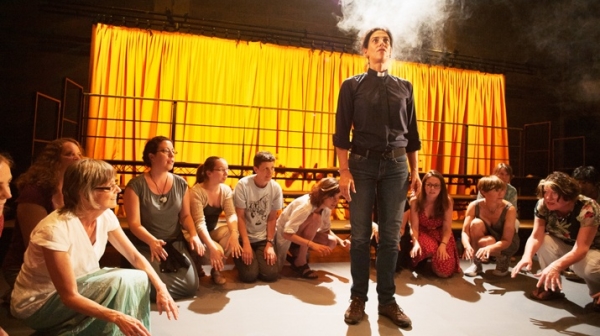ATC's Ramin Gray: 'The spirit of invention at Edinburgh is as alive as ever'
The acclaimed director discusses his latest show ”Blind Hamlet” and why Edinburgh is still the “pre-eminent” festival to premiere new work
Ramin Gray is the artistic director of the Actors Touring Company (ATC), whose Edinburgh Fringe credits include Gray's The Golden Dragon and David Greig's multi-award winning The Events, which is currently running at the Young Vic. This year Gray is directing Nassim Soleimanpour's interactive Shakespeare adaptation Blind Hamlet, which runs at Assembly Roxy from 31 July to 25 August

Could you give us an introduction to Blind Hamlet?
The first line of Hamlet is "who's there?", and that resonates in two ways. One: literally, the identity of the character. Secondly, they are on the battlements and they really don’t know who is out there. When you make a play, write a play, create something, you don’t know who’s out there, you don’t know who they will become and you don’t know how to work with them. This play takes that as a jumping off point and tries to investigate who the audience are and what their relationship to this question might be. I suppose it ends up in the form that it is a play for a voice and an audience.
So the plan is to encourage the audience to sculpt the narrative and make decisions on the order of the play?
That was an ambition. But actually, that is so difficult to do, because if you really give the audience the freedom to sculpt the narrative, then, we discovered, it all becomes incredibly complicated. So now it is much more controlled, but it does still involve the audience. The audience come on stage and to a certain extent they are the play, but it is a more controlled interaction between them and this mysterious voice. It’s as if the audience have found a message in a bottle.
Is the 'blind' aspect then related to the blindness of the knowledge of how it is going to go?
I hope it starts like that. The character literally talks about a blindness that is afflicting him so it is absolutely a metaphorical blindness of not being able to really see what is going on around you and the weakness of perception. So it is a sort of game, a very simple game. You often don’t really know who is there; you could be communicating with a fiction.
Could you tell us more about the writer of Blind Hamlet?
Nassim Soleimanpour is Iranian and he lives in Tehran. I am half Iranian. He wrote a play called White Rabbit Red Rabbit that had some success on the Fringe and it will be there again this year. It’s a similar conceit in that he couldn’t leave Iran, so he sent out these plays which ask you, in a way, to communicate with him. So I got in touch with him, we started a conversation and Blind Hamlet has evolved over the last couple of years. We managed to bring him over to the UK, we made this thing and now he is back in Tehran. I persuaded him that he is the voice, so it has become something that is very close to him. He is the voice that is speaking directly to the audience; it’s not often with plays that you talk about the author's voice, the writer is always hiding behind the characters and situations. You talk about Pinter, but he is never onstage as it were. But this is an experiment to really put the author’s voice on stage. I think it is the most formally inventive piece we have done at ATC.
What's the company's background and ethos?
It’s been going for 32 years and has been consistently doing small scale, albeit adventurous touring, both in terms of where we go and in terms of the repertoire, which tends to be cosmopolitan or international or contemporary. I’d say those are all hallmarks of what we do. We try to make work which finds out who is in the places we visit, that communicates with the local area.When we did The Events, we used a local choir in each place we visited. I’m not a big fan of megabucks juggernauts that come into a town for a week and then move on; it’s almost as if they haven’t really got a sense of the place they've been in. So a play like Blind Hamlet is totally dependent on who is in the audience.
Is The Events difficult in terms of logisitics?
When we began it was really tricky because it was an unknown thing, but now it’s been garlanded and lauded and the word has got out, particularly amongst choirs, there are actually more choirs than we can fit into the play. The choirs have a fantastic experience because they see the play for the first time, but they are also participating. We all know that what audience want more and more of is engagement, participation, involvement. Theatre has always had to fight off other art forms, so for most of the 20th century it was about trying to be as visual as movies, or determinedly not visual to make a point that it was just about words. But I think in the last ten years or so what we’re seeing is fighting off the internet and the virtual space, so more and more plays are experiences. Look at the rise of immersive theatre, site specific theatre and audience participation; it’s all stressing the fact that we are all actually in this one place together, now.

Was ATC affected by the recent Arts Council NPO decisions?
We didn’t apply for more, we didn’t get more. We got exactly what we asked for. We’re happy. I spent a lot of time in America this year because The Events is going there and I've come back so grateful and so relieved that I live and work in the UK and so aware of the fact that, however much we moan about the small amount of money we get compared to say, the Germans or the French, the transformative effect of it here is astonishing. I came back from the US seething with rage. It’s the wealthiest country on the planet and I look at the conditions in which the artists work and how the theatre scene operates and it’s terrible. I know we all have to constantly be vigilant and preserve the principal so to speak, but I think the Arts Council is actually doing relatively well. I say that from the point of view of someone who has their money, of course, so I don’t want to sound arrogant. But it’s something that is very important that we have to keep fighting for.
Why do you choose to premiere new work at the Fringe and do you believe that it is still a good place to present new work?
As we are a touring company, opening at Edinburgh makes total sense because we know a lot of international people fly in, particularly in British Council showcase years. We’ve been all over the world with Edinburgh as a springboard, so for a touring company that is very important. But equally, we are still going this year, which is not a British Council showcase year, because it is still the pre-eminent place where stuff is invented, tried out and tested. Particularly with something like this which is more experimental. I started going to the Fringe years ago and when I went back after a few years away I was shocked at the division between theatre and comedy and about the commercialisation of Edinburgh. But the spirit of experimentation is probably more present now than it ever was, in the sense that everything seems to have got bigger; the poorer have got poorer, the richer have got richer, the wackier have got wackier, the conservative people have got more conservative and there is absolutely a niche and a place for companies like us. It’s just important to be there I think.
But you're an established company – surely it's become harder for newcomers to make a name for themselves?
You say that, but with the internet, with the rise of sites like WhatsOnStage, it’s been transformative because you no longer need to rely on a few print or broadsheets for coverage. It was really hard even five years ago to get a review or to get noticed. And though the ever increasing number of shows make it seem like a more confusing Fringe, I’m not convinced like some people are that it’s a worse Fringe. There’s so much going on everywhere, which is fantastic and daunting and challenging and makes all of us raise our game I think. There is so much more going on than when I was starting out 20, 25 years ago.
What are the plans for Blind Hamlet post-Fringe?
We have got some dates booked across the UK throughout the autumn, and I’m sure we will tinker and develop this play in response to what audiences tell us in Edinburgh. Then I hope we find a really clever way of touring which will evolve the model of four actors in a van with a set. That will potentially give us a new way of touring, travelling and communicating with people in different places. It’s a big risk, this show, but if it works, it could open a new door.
FOR MORE ON EDINBURGH 2014 VISIT WHATSONSTAGE.COM/EDINBURGH-FESTIVAL












